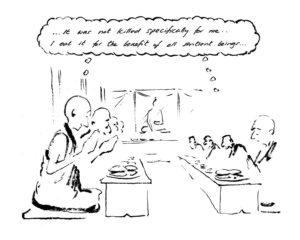The Mythical Mental Reboot
To get away from destructive patterns some put their hopes into the idea of the mental reboot, thinking that by taking oneself away from harmful objects, and through other methods, the mind will return to a neutral state, and that through this alone a mental reboot will happen – a reboot of the mind in a more wholesome manner, perhaps a manner one knew earlier in life. If it were just that easy, we would all be enlightened.
What this does not take into consideration is that mind is a creature of habit, that one cannot undo past actions and that one can never start from scratch. Without having a strong inner antidote or counterforce to one’s afflictions and inner demons, upon returning to one’s usual environment one’s old habits arise again strongly in one’s mind, and soon one is acting in the same way as before all over again.
The Buddha taught that there are things to be abandoned, and that there are things to be cultivated. Examples for that to be cultivated and internalized are the positive qualities of love, compassion, generosity, patience, renunciation and wisdom. The more we have of those, automatically the less we have of the opposite.
- The more love, compassion and patience, the less anger.
- The stronger the generous mind wanting to give, the less greed,
- The more renunciation, the less grasping and clinging desire,
- The more wisdom, the less ignorance just living in the moment, without awareness of cause and effect.
- The more mindfulness of the kindness of others, and the more gratitude, the less pride and isolation.
- The more altruism, the less self-cherishing, the less anger, the less anything negative.
It is like switching on the light, the darkness goes away automatically at the same time, without having to focus on it.
This is the path of the antidote.



